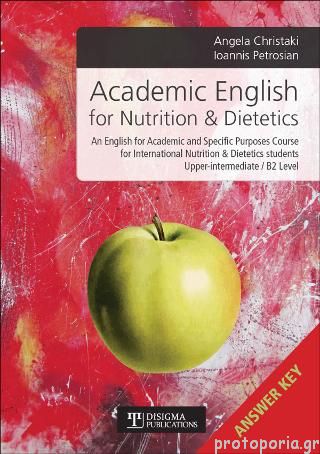0
Your Καλαθι
Academic English for Nutrition and Dietetics - Answer Key
An English for Academic and Specific Purposes Course for International Nutrition and Dietetics students
Upper- intermediate / B
Έκπτωση
10%

10%

Περιγραφή
Academic English for Nutrition & Dietetics is an ESP, EAP course book for international university students in the field of Nutrition & Dietetics and Food Technology. By the end of the course, the students will have acquired subject specific vocabulary and academic competencies that will help them with research, postgraduate studies and a career in a globalised environment. The course also aims at improving the students’ receptive and productive skills and helping the future nutritionists/dietitians embark on their professional careers. The following areas will be practiced:
reading, understanding and elaborating authentic scientific texts
writing according to context and using several techniques of academic writing i.e. paraphrasing, summarising, avoiding wordiness/repetition/plagiarism
identifying the topic and purpose of authentic listening texts by recognising key lexical items, scientific conventions and the role of discourse markers
practicing speaking interrelated with listening, reading and writing i.e. producing a monologue (making a speech/presentation) or participating in a dialogue
acquiring subject specific vocabulary by using collocations, deducing meaning through guessing, parallelising, contextualising, and activating schemata
taking notes while reading/listening and using them appropriately while speaking/writing
transmitting information or the outcome of research i.e. making presentations, describing process/ charts & diagrams, writing a lab report/ abstract/ paper/ research proposal, referencing
improving critical thinking: taking a stance, considering source credibility, comparing, thinking about implications and analysing pros and cons
revising language and grammar functions: expressing cause & effect, using defining/non-defining clauses, expressing ability/possibility, using verbs of reference, subject-verb agreement
acquiring soft skills: collaborating to solve a problem, accepting different opinions, learning to disagree
practicing working in the field of Nutrition & Dietetics: the first appointment with a nutritionist dietitian, conducting a diet history interview, applying for a job.
reading, understanding and elaborating authentic scientific texts
writing according to context and using several techniques of academic writing i.e. paraphrasing, summarising, avoiding wordiness/repetition/plagiarism
identifying the topic and purpose of authentic listening texts by recognising key lexical items, scientific conventions and the role of discourse markers
practicing speaking interrelated with listening, reading and writing i.e. producing a monologue (making a speech/presentation) or participating in a dialogue
acquiring subject specific vocabulary by using collocations, deducing meaning through guessing, parallelising, contextualising, and activating schemata
taking notes while reading/listening and using them appropriately while speaking/writing
transmitting information or the outcome of research i.e. making presentations, describing process/ charts & diagrams, writing a lab report/ abstract/ paper/ research proposal, referencing
improving critical thinking: taking a stance, considering source credibility, comparing, thinking about implications and analysing pros and cons
revising language and grammar functions: expressing cause & effect, using defining/non-defining clauses, expressing ability/possibility, using verbs of reference, subject-verb agreement
acquiring soft skills: collaborating to solve a problem, accepting different opinions, learning to disagree
practicing working in the field of Nutrition & Dietetics: the first appointment with a nutritionist dietitian, conducting a diet history interview, applying for a job.
Κριτικές
Δεν βρέθηκαν δημοσιεύσεις



